Super Bowl LVIII Watch Party at Celia’s in Antioch
Thursday, February 8th, 2024
Visit www.celiasantioch.com for menu.

Visit www.celiasantioch.com for menu.

“Let’s get the hearings done and…these guys back to work.” – APOA attorney Mike Rains
By Allen D. Payton
An investigation begun last March into the racist texts sent or received by at least two dozen Antioch Police Officers, with them being placed on paid administrative leave, is still not completed. That has left the department severely depleted from the 115 sworn officers authorized in the budget but only 81 on the force, not including the four new officers to be sworn in next Tuesday. Of that figure, 31 sworn officers are currently on some form of leave resulting in 50 actively working as of Wednesday, Feb. 7, 2024.
As previously reported, most of the officers caught up in the scandal only received some of the text messages but didn’t send any. (See related articles here and here)
Questions about the situation were sent on Wednesday, January 31, 2024, to City Attorney Thomas L. Smith, Acting Chief Joe Vigil, APD media relations officers and the Vice President of the Antioch Police Officers Association (APOA) Sgt. Loren Bledsoe. They were asked, “Is the investigation of the officers on paid leave in the text scandal completed, yet? If not, when will it be completed” and “have they all been interviewed, yet? If not, when will they be interviewed, how many have been interviewed, to date and how many officers still need to be interviewed?”
They were also asked, when will the officers who merely received but didn’t send any texts be put back to work, have any of them yet and if so, how many.
Vigil was specifically asked, “How many of the sworn officers on the Antioch Police force are currently active?”
The questions were turned over to the records division as a Public Records Act (PRA) request which allows government agencies in California up to 10 business days to respond. On Wednesday, February 7, Police Records Supervisor Amanda Nelson responded, “We currently have 85 officers on our roster, to include active duty and those on some sort of leave.” But she did not provide answers to the other questions.
Vigil shared that four new officers, included in that figure, will be sworn in next Tuesday, Feb. 13 and Lt. Mike Mellone responded, “We have 31 officers on some type of leave (including both administrative and medical leave).”
But no response was received about the current status of the investigation from City Attorney Smith
UPDATE: APOA Attorney Says “Let’s Get These Guys Back to Work”
However, APOA attorney Mike Rains, who was also asked some of the same questions did respond.
“I think all the officers have been interviewed who are on leave, some once, some twice,” he stated. “I think all of the officers remain on administrative leave.”
“Some have now been fired or left because of the criminal case. But there aren’t many of them,” he continued.
Asked how many of the officers his office represents Rains said, “We represent at least 16. I’ve tried to be in constant communication with the City to try to get them to be put back to work. These guys didn’t do anything wrong. If the department thinks they did, they didn’t do anything they deserve to get fired for.”
“In many cases the investigators have said there’s no violation of policy. But the City is not obligated to follow any recommendations of the investigators although they paid them a lot of money,” the attorney shared.
Asked if he knows when the investigation will be completed, Rains responded, “I don’t know how much longer it’s going to take. I keep telling them, ‘let’s get the hearings done and let’s get these guys back to work’.”
APOA VP Responds
APOA V.P. Bledsoe commented on the situation writing, “The APOA looks forward to the conclusion of this investigation, so we can focus on rebuilding the public’s trust. The department has been faced with unprecedented staffing shortages, resulting in unsafe working conditions for officers and unacceptable response times for the public. We hope that this investigation resolves soon so we can get back to providing the best possible police services to the citizens of Antioch.”
City Required to Follow State’s Hearing Disciplinary Process
As previously reported, the City is required to follow the state’s Skelly Hearing Disciplinary Process and the council members, in spite of Mayor Lamar Hernandez-Thorpe and Councilwoman Tamisha Torres-Walker both calling for all the officers under investigation to be fired.
The Skelly Hearing process which is like a Bill of Rights for city employees in California. According to the California Department of Human Resources’ Supervisors Guide to Addressing Poor Performance, the “Skelly Hearing is the name of the hearing the employee can ask for before the adverse action becomes effective to ensure no mistakes have been made by the department in taking the action. This hearing is a short, more informal due process-review of the department’s case and the employee’s defense. It is called a Skelly Hearing because the requirement was established through a court case entitled Skelly v .SPB.”
According to unlocklegal.com, “a Skelly hearing is better described as a pre-disciplinary due process meeting. This procedural meeting ensures that when an employee is facing disciplinary action, the accused employee is informed of the allegations, has an opportunity to refute the allegations, and has an opportunity to mitigate the allegations or rehabilitate their standing with their employer before any actual disciplinary action. It is a preliminary meeting that must take place in the case of an employee’s termination, demotion, suspension, reduction in pay, or transfer with an accompanying loss in pay.”
The city manager serves as the City’s Skelly Officer. The hiring and firing of all city employees starts and ends with the city manager who signs the papers for each staff member.
In addition, police officers in California have the Public Safety Officers Procedural Bill of Rights Act giving them an additional process and greater protections from termination.
The city council as a whole or as individuals have no say in the process of determining which city workers, including police officers, will remain employed or be terminated. The Antioch City Council currently only has the authority to hire and fire the city manager and city attorney.
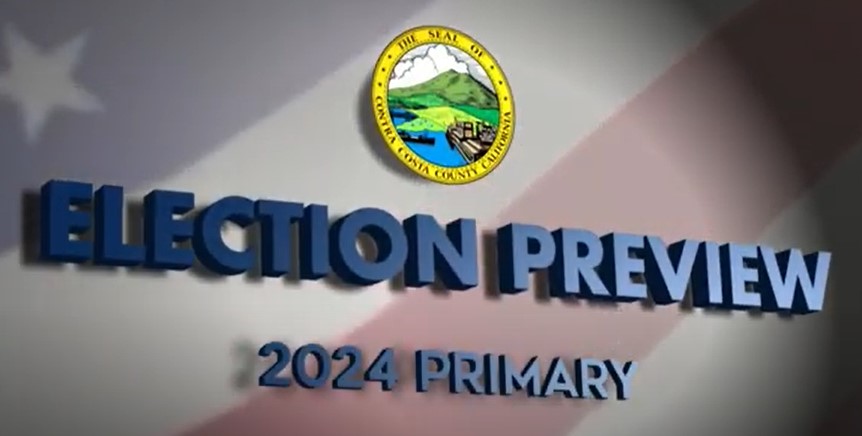
Hear from candidates for Supervisorial District 5, Assembly Districts 11 & 15 and Congressional District 10
Presented by Contra Costa TV, Elections Department and League of Women Voters of Diablo Valley
Contra Costa Television partners with the Contra Costa Elections Department and the League of Women Voters of Diablo Valley to bring you unbiased voter education information.
Watch 2024 Primary Election forums moderated by KTVU Anchor Claudine Wong, from Monday, February 5, 2024 – 8:00am to Thursday, February 29, 2024 – 7:00pm on Contra Costa County cable TV or watch the videos on the LWVDV YouTube channel or on the Contra Costa TV website.
Forums are scheduled for the following races:

All four candidates, Iztaccuahhtli Gonzalez, Jelani Killings, Shanelle Scales-Preston and Mike Barbanica participated.

Only incumbent Lori Wilson, Democrat and challenger David Ennis, Republican. Democrat Jeffrey Flack and Republican Wanda Wallis did not participate.

The three Democrats, Anamarie Avila Farias, Karen Mitchoff and Monica Wilson participated. Republican Sonia Ledo did not.
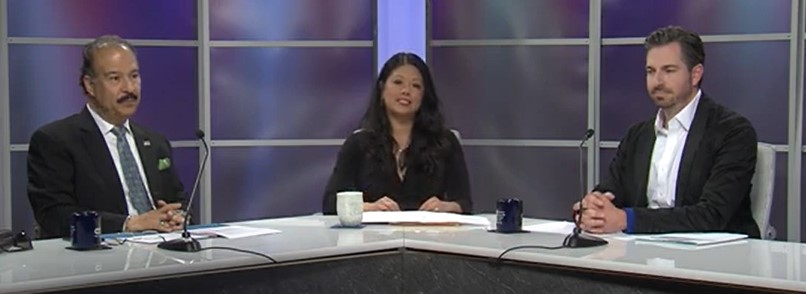
Only candidates Joe Sweeney and El Sherbini Mohamed, both independents, participated. Incumbent Mark DeSaulnier, Democrat, and Republicans Nolan Lee Chen and Katherine Piccinni, and independent Musa Jalis did not participate.
Click here to see the details, including broadcast times and channels.
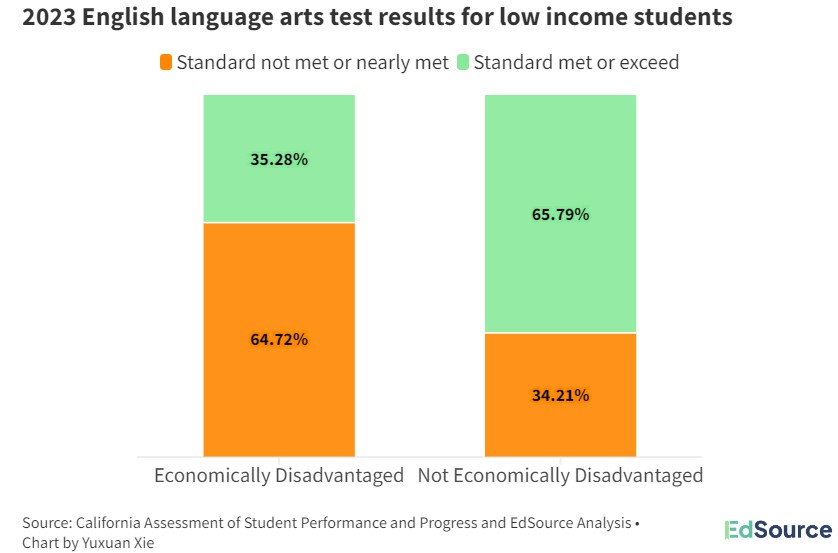
Pointing to dismal test scores, veteran lawmaker and a coalition of advocacy groups introduce AB 2222
By John Fensterwald, EdSource.org – Republished with permission
A veteran legislator who taught elementary school for 16 years introduced comprehensive early-literacy legislation Wednesday that would impose requirements on reading instruction and add urgency to the state’s patchwork of reading reforms.
Evidence-based practices, collectively known as “the science of reading,” would become the mandated approach to reading instruction for TK-5, if Assembly Bill 2222, authored by Assemblymember Blanca Rubio, D-Baldwin Park, becomes law.
The bill would shift the state’s decade-old policy of encouraging districts to incorporate fundamental reading skills in the early grades, including phonics, to demanding that they do so. This would depart from the state policy of giving school districts discretion to choose curriculums and teaching methods that meet state academic standards.
Between now and 2028, all TK to fifth-grade teachers, literacy coaches and specialists would be required to take a 30-hour-minium course in reading instruction from an approved list.
School districts and charter schools purchasing textbooks would select from approved materials endorsed by the State Board of Education in a new round of textbook adoption.
The California Commission on Teacher Credentialing would receive money to add several experts for accreditation of teacher preparation programs in the science of reading. The bill would strengthen accountability for those programs that have not taught effective reading strategies, as required under recent state law.
Rubio and the advocacy nonprofits EdVoice, Decoding Dyslexia CA, and Families in Schools, the bill’s co-sponsors, argue that another generation of California children cannot wait for districts teaching ineffective techniques using inadequate materials to come around.
“California is facing a literacy crisis,” the first sentence of the bill states. “There are far too many children who are not reading on grade level by the end of third grade and who will not complete elementary school with the literacy skills and language development they need to be successful academically in middle school and high school.”
Only 43% of California third graders met the academic standards in the state’s standardized test in 2023. Only 27.2% of Black students, 32% of Hispanic students, and 35% of low-income children were proficient, compared with 57.5% of white, 69% of Asian and 66% of non-low-income students.
“There’s always this delicate balance between local control versus let’s move forward collectively,” said Marshall Tuck, CEO of EdVoice and former candidate for State Superintendent of Public Instruction. “But when we have an issue that the vast majority of lower-income kids, who are disproportionately Black and Latino, are not reading at grade level, it requires urgency to do what we know works as fast as possible.”
Rubio, who recalled being handed coloring books instead of reading lessons in first grade as a non-English-speaking Mexican immigrant, said that data on the effectiveness of the science of reading convinced her to author the bill. However, her own experience as a fourth-grade teacher who previously taught kindergarten and first grade reinforced it.
“When I have fourth graders that are at first- or second-grade reading, something’s wrong. I can tell you right then and there, if a kid doesn’t know phonics in the fourth grade, we screwed them up somewhere. If they’re not reading in the third grade, they may never recover,” said Rubio, who was first elected to the Assembly in 2016.
The science of reading refers to research from neurology, psychology, and the cognitive and developmental sciences about how children learn to read. In the last decade, 47 states and Washington, D.C., have enacted laws to incorporate elements of the science of reading strategies. Fewer — Mississippi, Connecticut, Tennessee, and Virginia among them — have adopted and funded policies that coordinate multiple key elements: preparing and training teachers, supplying them with aligned instructional materials, testing for learning difficulties like dyslexia and engaging parents.
California is among the 47 states. Within the past three years, Gov. Gavin Newsom and the Legislature enacted discrete pieces of a state policy.
They funded $25 million to the University of California San Francisco to create a screening test for the risk of dyslexia and other learning difficulties; universal screening of K-2 students will begin in 2026-27.
They passed legislation to create a teaching credential for TK-3 that includes new literacy standards grounded in the science of reading; teacher preparation programs must introduce them starting next fall, and teachers will take a performance assessment as part of their new credential.
Newsom included $500 million in the last two state budgets for hiring and training of literacy coaches in the 5% of schools with the most low-income students. The Sacramento and Napa county offices of education, strong advocates of the science of reading, are overseeing the effort.
At the encouragement of State Board of Education President Linda Darling-Hammond, a professor emerita at the Stanford University School of Education, Newsom included $1 million in the current budget for a “literacy road map,” which will serve as a guide, with online resources, for districts to implement evidence-based reading strategies. Leading that effort are two respected literacy experts, Bonnie Garcia and Nancy Brynelson, whom State Superintendent of Public Instruction Tony Thurmond named the state’s first state literacy co-directors.
Tuck credits the steps taken by the Legislature and Newsom, “who has been an anchor on early education.” But guidelines won’t ensure that students in all districts will receive effective reading instruction —especially high-poverty schools that may be “slower to make adjustments when they’re dealing with so many challenges and so much complexity.”
Megan Potente, co-state director of Decoding Dyslexia CA, points to her 20 years as a teacher, who, as a new teacher frustrated by the ineffectiveness of her reading training, took a course on phonics and fundamental reading skills. “You feel like you’re not good at your job, and you weren’t equipped. And that’s a terrible feeling for new teachers,” she said. “So I went back to school, and I learned what I needed.”
Years later, she became a coach, supporting teachers in districts using balanced literacy that de-emphasizes evidence-based practices. She found it difficult to apply what she knew, she said, “because the curriculum materials didn’t follow the science; the teaching methods didn’t follow the science.”
A piecemeal approach to reading reforms inevitably leads to a game of “whack-a-mole,” former Tennessee Education Commissioner Penny Schwinn, who is credited with implementing successful comprehensive policies in her state during the pandemic, told EdSource.
Newsom did not require nor explicitly encourage districts to use the $20-plus billion they received in federal and state Covid-relief funding on teaching training in the science of reading nor on updating reading texts and materials. Now that the state is heading into a lean budget year, a scarcity of funding, particularly for teacher training, could set back a timeline to implement the bill. Newsom’s proposed budget for 2024-25 includes no significant money for new TK-12 programs.
A spokesperson for the Newsom administration, which usually declines to discuss pending legislation, offered no further comment.
AB 2222 would define evidence-based literacy instruction as “evidence-based explicit and systematic instruction in phonological and phonemic awareness, phonics, vocabulary and oral language development, fluency, comprehension, and writing … that adheres to the science of reading.” (Phonics are rules that relate letters in words to the sounds of spoken language. A phoneme is the smallest element of a sound within spoken language. Phonemic awareness reflects the ability to understand that words combine multiple phonemes when pronounced.)
The bill sets requirements for three principal elements of literacy instruction:
Starting in March 2026 and no later than June 30, 2028, all teachers in grades TK to 5 must complete an approved professional development and training program satisfactorily. The California Department of Education would appoint one or more county offices of education with expertise in the science of reading and evidence-based literacy instruction to serve as the state literacy expert lead that would select the list of eligible training programs. Districts would have to notify parents if fewer than 90% of the required teachers failed to complete the course.
The last state textbook adoption for English language arts and English language development was 2015. The bill would require the State Board of Education to complete the next adoption cycle by Jan. 1, 2026, for TK through eighth grade. The materials would have to adhere to the science of reading. School districts would not be required to replace materials they’re currently using, but they would need a waiver to buy basic instructional materials that aren’t approved.
Textbooks like “Units of Study,” by noted literacy author Lucy Calkins, whose instruction relies on visual cues, including the three-cuing method of reading, would not be eligible for the approved list.
The bill would strengthen the accountability requirements of landmark Senate Bill 488, the 2023 law that requires instructing candidates for a TK-5 or elementary credential in evidence-based reading instruction.
It would require the Commission on Teacher Credentialing to establish a probationary accreditation process for teacher prep programs that aren’t meeting the literacy instruction requirements. Faculty in those programs would have to complete professional development in the science of reading for the program to avoid a loss of accreditation.
The bill would provide funding for the credentialing commission to hire experts in the science of reading to help with program accreditation. One of the dozen members of the Committee of Accreditation would have to be an expert in the science of reading.

Just in time for Valentine’s Day! “Looking for love in all the wrong places?”
Many have turned to online dating and social media throughout the last couple of years. New apps have been developed, and some social media platforms have even created ways to find your better half online. Unfortunately, these platforms have not only made it easier than ever to meet new people and find dates but have also made it easier to be scammed as well. Con artists create compelling backstories and full-fledged identities, then trick you into falling for someone who doesn’t exist. This form of deception is known as “catfishing”. Better Business Bureau (BBB) has witnessed a growth in romance scams in recent years. With Valentine’s Day around the corner BBB encourages those looking for love to be wary of fraudsters. Don’t let your quest for love blind you to the realities of romance scams.
How the scam works:
Most romance scams start with fake profiles on online dating sites created by stealing photos and text from real accounts or elsewhere. Scammers often claim to be in the military or working overseas to explain why they can’t meet you in person. Over a short period of time, the scammer builds a fake relationship with you, exchanging photos and romantic messages, even talking on the phone or through a webcam.
Just when the relationship seems to be getting serious, your new sweetheart has a health issue or family emergency or wants to plan a visit. No matter the story, the request is the same: they need money. But after you send money, there’s another request, and then another. Or the scammer stops communicating altogether.
Tips to spot this scam:
Protect yourself from this scam:
To report a scam, go to BBB Scam Tracker.
Check out our romance scam resource page at BBB.org/romance.

ABOUT BBB: The Better Business Bureau has empowered people to find businesses, brands, and charities they can trust for over 110 years. In 2022, people turned to BBB more than 250 million times for BBB Business Profiles on more than 5.3 million businesses and Charity Reports on about 12,000 charities, all available for free at BBB.org. The International Association of Better Business Bureaus is the umbrella organization for the local, independent BBBs in the United States, Canada, and Mexico.
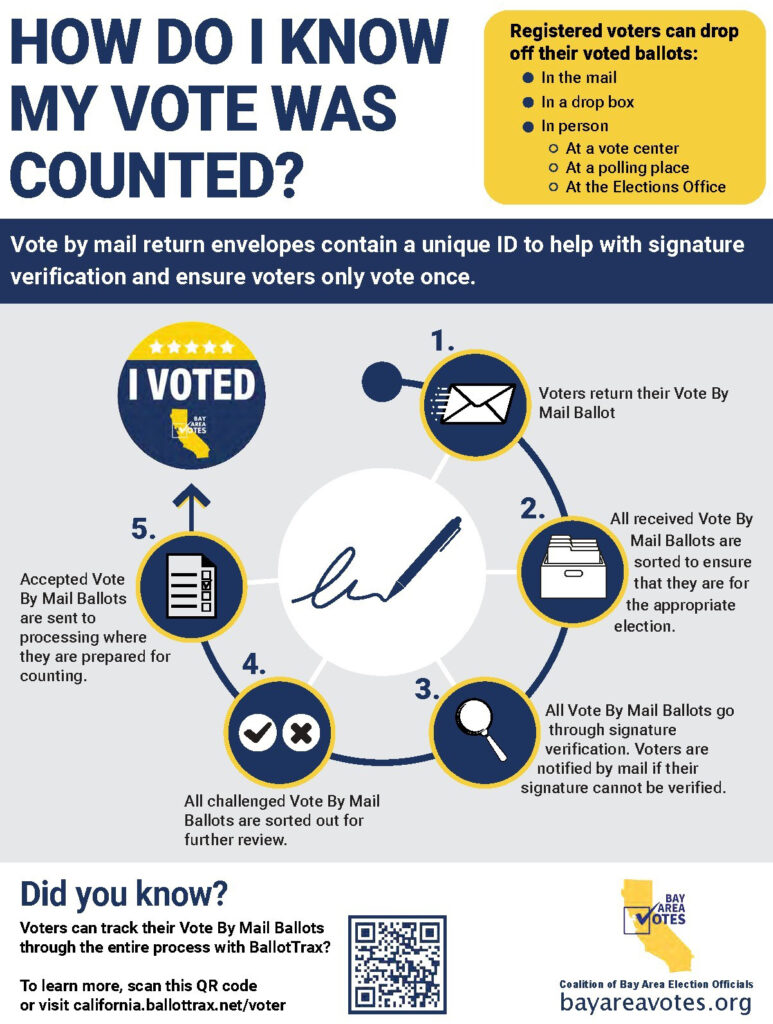
Voting in person and by mail has begun; public test of county’s Vote by Mail counting equipment Friday, Feb. 9
Across the Bay Area, elections officials have dropped ballots in the mail and those ballots will be arriving in mailboxes this week. Bay Area Elections Officials encourage you to vote early!
Contra Costa residents should note that if they do not receive the ballot they were expecting, they can contact their local Registrar’s office to find out more about receiving the ballot they wish to vote.
All eligible California voters will receive a ballot in the mail for the March 5, 2024 Presidential Primary Election. Remember that Contra Costa residents have many options to cast their ballot.
Don’t forget to sign your envelope!
Contra Costa County Registrar of Voters, Kristin Connelly, wants you to know “we are here to help you understand the process and ensure that you cast your vote and that it is counted.”
Voters who vote by mail can track their VBMballot to know when it is mailed, received, and processed by the county elections office. Sign up at the Secretary of State’s office (https://wheresmyballot.sos.ca.gov). See the attached graphic to better understand what the vote by mail process looks like.
Information on this topic as well as direct links to local elections offices can be found on our website, BayAreaVotes.org, or our Facebook page, Bay Area Votes. For more local information, go to your local county election official, who is your trusted source of nonpartisan election information.
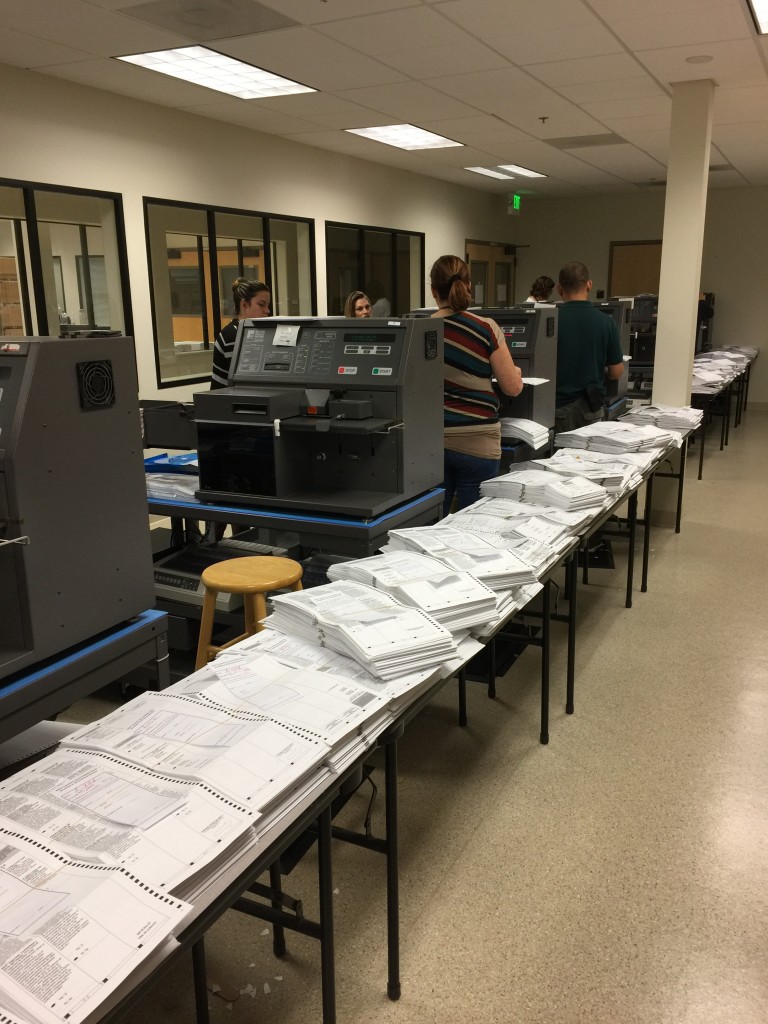
Contra Costa Election Equipment Testing to Ensure Accuracy, Friday, Feb. 9
The March 5, 2024 Presidential Primary Election is underway. Ballots have been mailed and the elections office is ready to receive voted ballots sent by mail or dropped in drop boxes. The Contra Costa County Elections Division will perform the County’s official logic and accuracy testing on central ballot counting and processing equipment at 10:00 am Friday, February 9, 2024, at the Elections Office, located at 555 Escobar Street in Martinez and the public is invited to observe.
Logic and accuracy testing is a standard pre-election procedure. The test will confirm that all central count equipment is in working order and functioning properly. A set of test ballots will be run through each scanner to ensure they are properly programmed and operating as expected.
If you would like to observe this process, we encourage you to let us know in advance by contacting the Elections office at 925-335-7800. On the day of testing, visitors will be asked to check-in at the Elections lobby on the first floor.
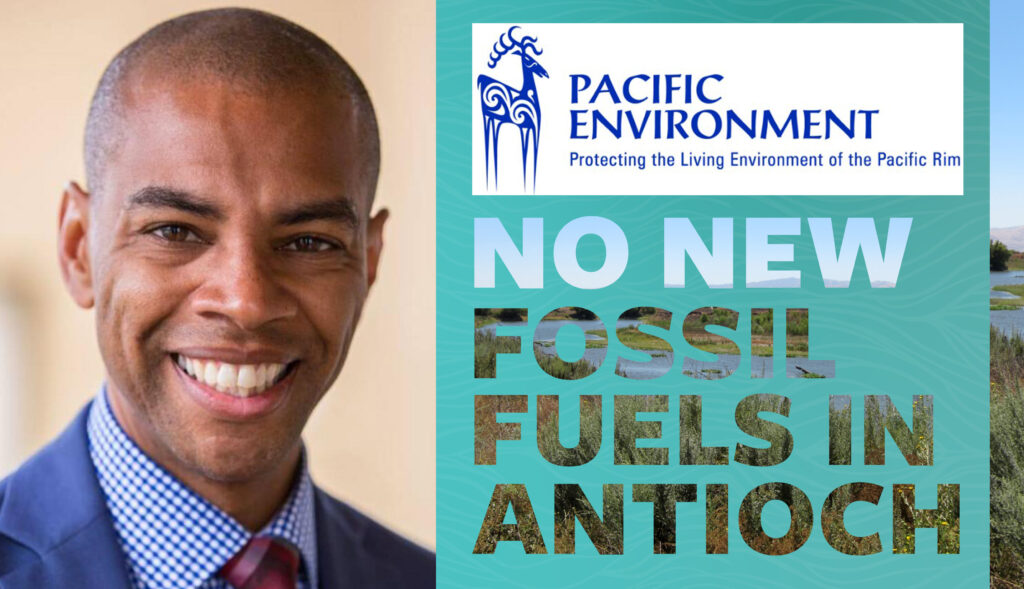
The pledge would reject any new, renewed public investments in gas or oil infrastructure in the city
“It does result in something if any of that comes about.” – Hernandez-Thorpe
Claims current atmospheric river storm is due to climate change caused by fossil fuel use
By Allen D. Payton
Today, Thursday, February 7, 2024, Antioch Mayor Lamar Hernandez-Thorpe made a world-leading commitment to reject public investments in new, renewed, fossil fuel infrastructure in Antioch and steer the city toward timely climate mitigation and resilience.
“I’ve promised to address climate change head on,” saidHernadez-Thorpe. “We’ve ended oil and gas drilling in Antioch and, today, following a historic atmospheric river caused by climate change that has wreaked havoc across California, I have committed to end investing in new fossil fuel infrastructure. Moving away from fossil fuels will protect the health of our community, our air and water and leave a liveable planet for the next generation.”
Following the mayor’s press conference held earlier in the day, a press release on the matter was issue. It reads, “The pledge is a commitment to reject public investments in new, renewed or expanded fossil fuel infrastructure in the city of Antioch, CA. Fossil fuels are harming our families and communities. The average global temperature on Earth has irreversibly risen by at least 1.9 degrees Fahrenheit since 1880, with most of this increase occurring since 1975. Fossil fuels, including coal, oil and gas, are the largest contributor to global warming, accounting for 75% global greenhouse gas emissions and 90% of all carbon dioxide emissions.”
“We applaud the city of Antioch’s first-ever commitment to rejecting new fossil fuel infrastructure,” said Dawny’all Heydari, Climate Campaign Manager, Advocacy for Pacific Environment, which works to protect people, wildlife and ecosystems around the Pacific Rim and the authors of the pledge. “The warnings from the international scientific community and recent catastrophic weather in California make clear that there is no time to waste in moving to a zero emissions world. We call on mayors across the United States and globally to follow Hernandez-Thorpe’s lead and say no to new fossil fuel buildouts.”
The press release further claims, “As a result of fossil-fueled global warming, Antioch will continue to experience longer, hotter and more common heatwaves, and increased flooding from increased chances of extreme precipitation and sea level rise.
In the last week, a historic atmospheric river made worse by the effects of the climate emergency has wreaked havoc on communities across California, causing at least 875,000 power outages, four deaths, record-breaking rain and flooding, and $11 billion in damages to homes and other property.”
PLEDGE BACKGROUND
By signing the pledge, the Mayor of the City of Antioch has committed to:
Pacific Environment Rep, Hernandez-Thorpe Clarify His Pledge
Hernandez-Thorpe was asked what public investments and fossil fuel buildouts he is referring to, and if it’s the City’s gas pump used by the city-owned vehicles. Gwen Dobbs of Pacific Environment was asked the same question and passed them along to Heydari.
In response, the Climate Campaign Manager shared, “The mayor is committing to reject new, renewed or expanded public investments in the following fossil fuel infrastructure: oil and natural gas wells and drilling, coal mining, petroleum gas stations, bunkering facilities for ships and planes, power plants (including coal, oil, and natural gas), pipelines, oil refineries, transport terminals, natural gas processing plants, petrochemical plants and gas connections to new buildings.”
But while the city council can vote to approve or deny all those things, the City of Antioch has never invested in them, except for perhaps, possibly gas connections to new buildings that the city builds and owns. Hernandez-Thorpe, Heydari and Dobbs were then asked to further clarify the matter that if, by signing the pledge, the mayor is committing he will not vote to approve another home or commercial building in Antioch that has a connection to natural gas and that all new construction in Antioch must be all electric.
The mayor was also asked to further clarify what he’s committed to not doing and how far and wide the commitment reaches. Specifically, he was asked regarding “transport terminals” if he is also committing to not vote for a deepwater port along the Antioch shoreline if the ships that dock there use fossil fuels.
Challenged with the statement that the pledge really doesn’t mean anything in Antioch since the city doesn’t invest in the items listed, Hernandez-Thorpe provided clarity explaining, “It does result in something if any of that comes about. I would not support something like that. It doesn’t mean it can’t happen in Antioch.”
Speaking specifically about the City’s gas pump in the Maintenance Department’s yard he said, “We wouldn’t want to expand that. But we are working to expand to more charging stations and converting the city’s fleet to all electric. That’s the most obvious example. Our best option was to purchase hybrid vehicles for now, because the supply chain was preventing going all electric, which are matters beyond our control. We have to live in reality.”
Regarding the transport terminals, Hernandez-Thorpe said, “This wouldn’t preclude a deepwater port. What the pledge states is that there are fueling stations for ships. But we’re not stopping a deepwater port from being approved.”
“Our goal is to transition from this but not leave workers behind. There needs to be a balance,” he added.
Follows Other Actions Opposed to Oil and Gas Issues in Antioch
Today’s actions follow two others he has supported to reduce dependence on fossil fuels. In 2021, the mayor, following the lead of current Mayor Pro Tem and District 4 Councilwoman Monica Wilson and joined by District 1 Councilwoman Tamisha Torres-Walker, voted, in a split council action, to not renew the franchise agreement with the company that owns the natural gas pipeline that runs beneath the city. As a result, the pipeline owner, California Resources Production Corporation is suing the city costing thousands in fees to contract attorneys. CALIFORNIA RESOURCES PRODUCTION CORPORATION vs CITY OF ANTIOCH
In 2022, the council voted unanimously to ban future oil and gas drilling in the city, which does not prevent the only person who currently owns drilling rights in Antioch from doing so.

Police seek all three unknown males, public’s help
By Lieutenant D. Bittner #3252, Antioch Police Community Policing Bureau
On Tuesday, Feb. 6, 2024, at 6:50 p.m., Antioch Police officers were dispatched to E. 18th Street and Hillcrest Avenue for multiple callers reporting gun shots followed by a vehicle collision with injuries. It was determined that two unknown males assaulted another male in a nearby parking lot. As the two initial assailants retreated to their vehicle, the assault victim retrieved a handgun and fired multiple gunshots at the vehicle as it was leaving the parking lot.
The vehicle performed a U-turn against a red light at the above intersection while fleeing from the gunfire and collided with an uninvolved vehicle traveling east on E. 18th Street. The occupants of the vehicle being shot at fled on foot after the collision and were not located. The shooter fled the scene in a vehicle and was not located. The driver of the uninvolved vehicle was transported to an area hospital with complaints of pain.
Anyone with information is asked to call the Antioch Police Department non-emergency line at (925) 778-2441.